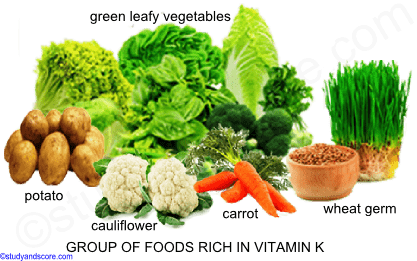Henrik Dam while studying the significance of cholesterol fed the hen with a diet which included no cholesterol. After a few months the hen showed signs of hemorrhages and bleeding. Immediately he started feeding these hens with purified cholesterol diet. But still the hen showed no improvement. So he concluded that, apart from cholesterol, some other compound was missing in the initial cholesterol depleted diet. This compound was names as coagulation vitamin (Koagulationsvitamin in German language) as its depletion caused hemorrhages and bleeding. This vitamin was designated as vitamin K.
Vitamin K is also known as the antihemorrhagic vitamin. The followinf are the three compounds with biological activity similar to vitamin K,

Vitamin K requirement depends on the amount of vitamin K formed by the intestinal bacteria. The more the endogenous vitamin K formation, less will be the dietary requirement.

Because vitamin K is fat soluble, its absorption is facilitated in the presence of bile salts mainly in the jejunum. Liver stores appreciable amounts of this vitamin.
Small amount of vitamin K is also stored in the heart, skin, muscle & kidneys. It is present in bloodstream in significant amounts. All tissues contain small amounts of vitamin K.
The deficiency of vitamin K results in low prothrombin level and increased blood clotting time. Consequently, deficiency of vitamin K lead to hemorrhagic and bleeding conditions not only in adults but also in infants and new borns.
It is mainly needed for formation of prothrombin, a substance necessary for blood clotting. Intestinal bacteria normally synthesize substantial amounts of vitamin K.

1. Explain the importance, requirements and sources of vitamin K.
2. How can the deficiency of Vitamin K affect human body? How to treat Vitamin K deficiency?
3. Write the functions of Vitamin K.
- Share with your friends! -
Login to post your comment here...
- or with social Account -